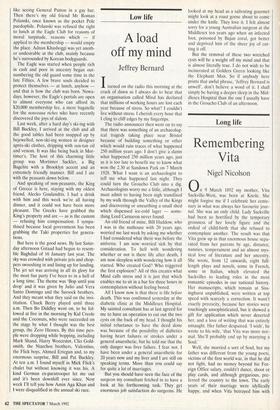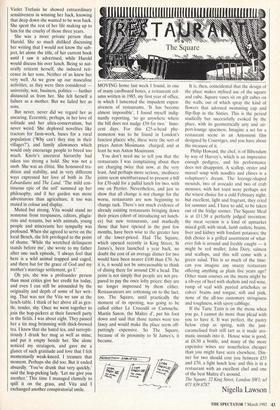Long life
Remembering Vita
Nigel Nicolson
On 9 March 1892 my mother, Vita Sackville-West, was born at Knole. She might forgive me if I celebrate her cente- nary in what was always her favourite jour- nal. She was an only child. Lady Sackville had been so horrified by the temporary grossness of her lovely figure and the ordeal of child-birth that she refused to contemplate another. The result was that Vita grew up in that enormous house sepa- rated from her parents by age, distance, nannies, temperament and an almost mys- tical love of literature and her ancestry. She wrote, from 12 onwards, eight full- length plays and novels, some in French, some in Italian, which elevated the Sackvilles to leading roles in the most romantic episodes in our national history. Her manuscripts, which remain at Siss- inghurst unpublished, were written at top speed with scarcely a correction. It wasn't exactly precocity, because her stories were touchingly unsophisticated, but it showed a gift for application which never deserted her, and a love of writing that was entirely untaught. Her father despaired. 'I wish', he wrote to his wife, 'that Vita was more nor- mal. She'll probably end up by marrying a Soul.'
Well, she married a sort of Soul, but my father was different from the young poets, victims of the first world war, in that he did not fight, had no money beyond his For- eign Office salary, couldn't dance, shoot or play cards, and although gregarious, pre- ferred the country to the town. The early years of their marriage were idyllically happy, and when Vita betrayed him with Violet Trefusis he showed extraordinary sensitiveness in winning her back, knowing that deep down she wanted to be won back. She spent the rest of her life making up to him for the cruelty of those three years.
She was a more private person than Harold. She so much disliked discussing her writing that I would not know the sub- ject, let alone the title, of her current book until I saw it advertised, while Harold would discuss his over lunch. Being so nat- urally reticent herself, she induced reti- cence in her sons. Neither of us knew her very well. As we grew up our masculine activities, as they were then considered — university, war, business, politics — further distanced us from her. She felt herself a failure as a mother. But we failed her as sons.
But never, never did we regard her as uncaring. Eccentric, perhaps, in her love of solitude and her ultra-conservatism, but never weird. She deplored novelties like tractors for farm-work, buses for a rural population ('Why can't they stay in their villages?'), and family allowances which would only encourage people to breed too much. Knole's ancestral hierarchy had taken too strong a hold. She was not a snob. She was an elitist. She honoured tra- dition and stability, and in very different ways expressed her love of both in The Edwardians and The Land. 'The mild con- tinuous epic of the soil' summed up her philosophy, and if her garden was more adventurous than agriculture, it too was muted in colour and display.
Muted but strong. Vita would stand no nonsense from trespassers, editors, plagia- rists and tenants, but with animals, young people and miscreants her sympathy was profound. When she agreed to serve on the local Bench, she felt privileged to the point of shame. 'While the wretched delinquent stands before me', she wrote to my father after one such episode, 'I always feel that here is a wild animal trapped and caged, and there but for the grace of God and my mother's marriage settlement, go I.'
Oh yes, she was a profounder person than most critics give her credit for today, and even I can still be astounded by the originality and depth of some of her writ- ing. That was not the Vita we saw at the lunch-table. I think of her above all as gen- tle, tender, shy. Once we went together to join the hop-pickers at their farewell party in the fields. I was about eight. They passed her a tin mug brimming with thick-brewed tea. I knew that she hated tea, and surrepti- tiously I drank her mug as well as mine, and put it empty beside her. She alone noticed my stratagem, and gave me a glance of such gratitude and love that I felt momentarily weak-kneed. I treasure that moment. Perhaps she did too. But it ended absurdly. 'You've drunk that very quickly,' said the hop-picking lady. 'Let me give you another.' This time I managed clumsily to spill it on the grass, and Vita and I exchanged another conspiratorial smile.



















































 Previous page
Previous page